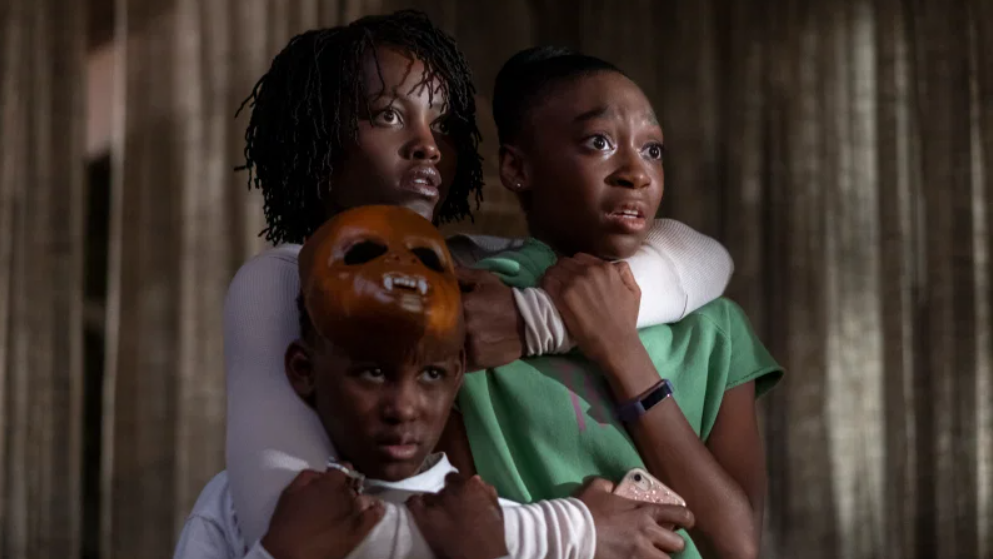Us
2019

Rated: R
Genre: Horror, Thriller
Country: U.S.
Run-Time: 1h 56min
Director: Jorden Peele
Cast
Lupita Nyong’o……………………..Adelaide Wilson/ Red
Winston Duke…………………..……Gabe Wilson/ Abraham
Shahadi Wright Joseph……..Zoa Wilson/ Umbrae
Elisabeth Moss……………..………..Kitty Taylor/ Dahlia
Regardless of what you think of his movies, you got to give Jordon Peele credit for being his own man. Each of his films have wildly original concepts that draw from sources other directors wouldn’t even consider.
I feel his second outing, Us, has some similarities to a lot of Korean films. The film is extremely well-paced and it is not afraid to mix genres, as there are plenty of moments of comedy mixed in with the horror. (This is kind of a staple in Peele’s films) Also, like many Korean films, Peele is willing to push social commentary over story as the film progresses.
After three films, I think it’s safe to say that Peel’s horrors are not rooted in traditional jump scares or gore. Like a lot of his work in comedy, Peele’s focus is making the audience always feel uncomfortable with what is happening. (This is pretty commonplace in a lot of Key & Peele sketches.) And this is what makes his films accessible to broader audiences that want to enjoy horror, but also still want to sleep at night. They leave a lasting impression without ever scaring the bejesus out of you. Sure, he’ll deliver a minor jump scare or two and some gore, but that unique, off-kilter atmosphere- along with those dashes of social commentary- is truly his bread and butter.
But with that said, having also seen Get Out and Nope, I’d say Us is easily the closest Peele has gotten to making a film with more traditional scares- and that’s to the credit of the actors who all really commit to the roles of their doppelgangers.
Us starts off in 1986, where we see a young girl named Adelaide get separated from her family at a carnival in Santa Cruz. Whether out of curiosity or by feeling the pull of destiny, Adelaide ends up wandering into a fun house that invites people to “Find Yourself”. Once there, she sees a different duplicate version of herself in a hall of mirrors and runs, presumably becoming selectively mute afterwards due to the traumatic experience.
Fast-forward to 2019 and grown-up Adelaide (Lupita Nyong’o) is now a mother of two. While at a vacation home with her family, Adelaide’s husband (Winston Duke) suggests they spend a day at the beach at Santa Cruz, but this triggers Adelaide’s anxieties. Naturally, the beach is too close to that old carnival and the day does not end up going as well as Wilson planned; and at night, when the family returns to their cottage, they are followed by a set of doppelgangers dressed in red.
In Get Out, Peele’s commentary on privilege and race is very overt. In Us the social commentary is slightly more subtle and tied more to class politics; not to say that there is no racial politics at play in film. As a middle-class Black American family, the Wilson family does not feel like they fully belong in suburban America, but their status is far above the impoverished Americans that the doppelgangers clearly symbolize. And it turns out, these doppelgangers are part of a larger epidemic, which helps enforce the point that the advancement of one group in society usually comes at the cost of another. But hidden amongst the class commentary are also targeted jabs at consumerism and the futility of producing real change within a capitalist system, despite our best intentions. In fact, Peele has packed Us so full of visual symbolism that it’s impossible to catch everything in one viewing. This is a film worth taking time afterwards on the Internet to learn about some of those things you might not have caught.
For much of its run-time, I actually liked watching Us better than Get Out. For one thing, it is a far bloodier affair. And once the action starts, it is non-stop. Plus, Peele’s doppelgangers are far more interesting than watching the usual zombie-infected- which are kind of their spiritual cousins- because they have chilling nuanced personalities of their own that contain many similar, albeit far more animalistic, quirks to the originals.
And those performances speak for themselves. In fact, when Us was released, some people thought that Lupita Nyong’o might get nominated for an Oscar for her dual role; but personally, I feel the kids who play the Wilson children (Shahadi Wright Joseph and Evan Alex) are also almost equally remarkable at bringing their doppelgangers to life. And The Invisible Man fans will also appreciate the inclusion of Elizabeth Moss and her demented other.
But out of all of Peele’s films, Get Out still remains his most consistent effort. I personally think Us loses itself a little when it finally provides an explanation for its mysterious occurrences. Peele tries to push the film’s social commentary to its furthest limits, but it comes at the expense of the film’s narrative logic. There are many who appreciate when horror is used as a metaphor- as in film’s like His House and Relic– but I personally find that films that this type of horror doesn’t generally provide the most satisfying conclusions.
Regardless, Us serves well as a well-paced, well-acted original horror that is likely to only grow in esteem over time because of its original concept, astute class commentary and the terrific dual-performances from all of its lead actors. Its pop-culture referencing symbolism also serves as a prelude for things to come. If you have seen Nope, you get what I’m talking about.
